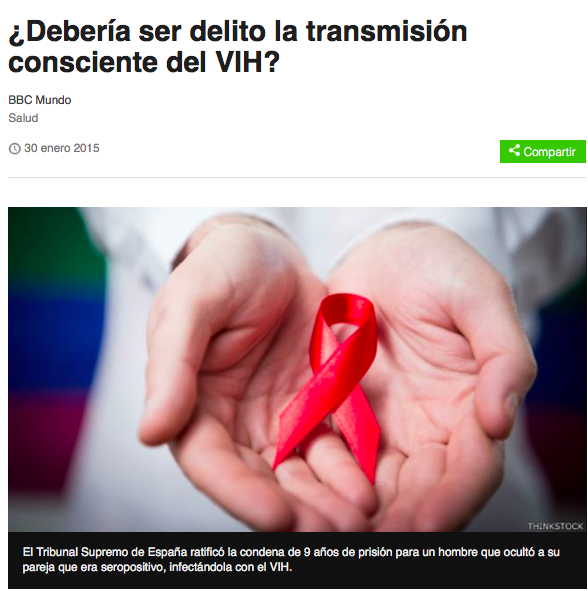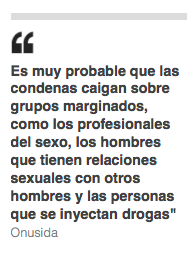State Lawmaker Targets People With HIV With Bill To Criminalize Exposure” by Zack Ford
Rhode Island state Rep. Robert Nardolillo (R) has introduced a new bill ( H 5245) that would criminalize exposing individuals to HIV without disclosing a positive status. Rhode Island is one of only 13 statesthat does not have such a law, but efforts are underway to roll back many of those other laws, which were passed when the virus was not as well understood as it is today.
Currently, Rhode Island does have a law that makes it a misdemeanor to expose another person to any sexually transmitted disease (STD), punishable by up to three months in jail and a fine of up to $100. Nardolillo told ThinkProgress that he doesn’t think this is appropriate for exposure HIV. “HIV is different. I put it alone,” he explained. “If this act happened, the penalty would be what?” According to his bill, it should be imprisonment up to 15 years and a fine up to $5,000.
A freshman legislator, Nardolillo openly discussed in his campaign that he was a victim of sexual assault as a minor and that he thus has “very strong views on sex offenders and the weak legislation that continually fails to protect those who are, have been, and will be victimized.” He noted that Rhode Island’s current laws offer “no penalty or enhancement” when STD transmission takes place during a sexual assault, though individuals can be punished for both. His new bill does criminalize when someone with HIV “forcibly engages in sexual intercourse,” but it also criminalizes when someone “knowingly engages in sexual intercourse with another person without first informing that person of his/her HIV infection.”
ThinkProgress confronted Nardolillo with studies that show that criminalizing HIV actually disincentivizes individuals from getting tested for HIV because they fear prosecution if they know their status is positive. As a result, the stigma against people with HIV increases and fewer people seek care for their HIV, which could increase their potential for transmitting the virus. “Have I read the research? I did,” Nardolillo confirmed, saying that he still felt that HIV was too serious not to prosecute in a distinct way.
ThinkProgress also asked Nardolillo about recent research showing that for HIV-positive people who have sought care and reduced their viral load to undetectable levels, it’s virtually impossible for them to transmit the virus to others. Should those individuals similarly be prosecuted for not disclosing their status? “I have no comment on that,” Nardolillo responded.
It was research about the risk of transmission that actually led the Iowa Supreme Court to overturn the conviction of a man who had been charged under that state’s HIV criminalization law last year. In fact, the Court said that, regardless of viral load, protected anal sex or unprotected oral sex are now known to carry such a minimal risk of transmission that they could not hold someone accountable for “risking” exposure when engaging in those activities. Nardolillo’s bill implicates any and all vaginal, anal, or oral sex with no qualifications as to whether protection is used.
Last year, Iowa became one of the first states to rescind its HIV criminalization laws, leaving penalties only for those who insidiously intend to transmit the virus. Though other states have not yet followed Iowa’s example, there is consensus among HIV/AIDS experts and advocates that they should. Both the Presidential Advisory Council on HIV/AIDS and the U.S. Department of Justice Civil Rights Division have recommended the repeal of state HIV criminalization laws. These laws, they argue, are not based on the medical evidence currently available and counter-intuitively increase stigma and interfere with prevention efforts, making it harder to fight the HIV epidemic, not easier.
The House Committee on the Judiciary will consider Nardolillo’s bill Tuesday afternoon. It currently has four other co-sponsors, but its prospects for passage are unclear.


